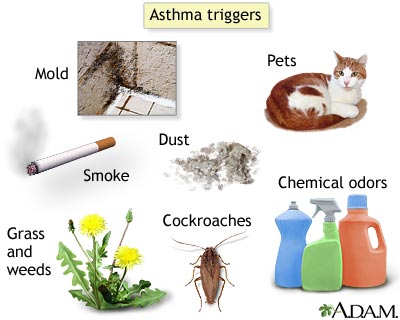
December 2, 2010 in Asthma
A lot of us generally assume that asthma only affects adults or children. but in reality, asthma can affect anyone irrespective of their age, sex or race. every parent must have a good idea about the toddler asthma symptoms. Often, these symptoms are ignored or taken lightly by parents due to lack of proper knowledge. In this article, we present the most common symptoms of asthma in toddlers. Read on to know more.
SymptomsSome of the most common toddler asthma symptoms include:
- Noisy breathing
- Persistent cough
- Wheezing or panting while performing normal activities
- Lethargy or lack of interest in playing or in their favorite activity
- Difficulty in eating
- Rapid breathing
- Rapid movement of the nostrils, chest and stomach (while trying hard to breathe)
Almost all of the toddler asthma symptoms mentioned above can be caused due to other respiratory infections too. Now, this is the tricky part. would ‘you’, as a parent, be able to determine the cause of the symptoms? The answer would be a definite NO (Of course, unless you are a doctor). The best thing to do would be to consult a doctor or a pediatrician.
The good news is that in most of the cases, asthma is not carried into adulthood. As they grow, toddlers develop immunity towards the disease. but this requires proper management of asthma in the initial stages.
Instructions to deal with toddler asthmaNow that you have read about the toddler asthma symptoms, is that all about it? is it enough to protect your toddler from asthma and its effects? You also need to know what to do in times of emergency. Taking the necessary precautions is an integral part of managing asthma. Here’s what you need to look for.
- Understand the asthma symptoms better. The may not be the same in every toddler. Look out for any signs of wheezing or persistent cough. Keep a track of the intervals at which the cough occurs.
- Regularly monitor your toddler for any signs of respiratory infections. Frequent bouts of infection can be a waring sign of reduced immunity and asthma.
- Risk factors like family history of asthma, parents who smoke, low birth weight, family members having allergies etc increase the chances of your toddler being affected by asthma.
- Write down any symptoms that you notice along with the timings at which they occur. Share them with your doctor. This would be of much help in determining the exact cause of the symptoms.
The number of people being affected by asthma is increasing with every passing year. Gain more knowledge about toddler asthma symptoms, causes, prevention, treatment and share it with others in order to fight the disease in its early stage itself.